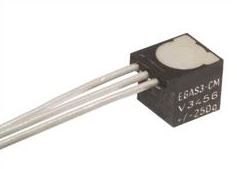 Accelerometers for vibration: Which is best for your application?
Accelerometers for vibration: Which is best for your application?
July 23, 2015 REDWIRE is news you can use from leading suppliers. Powered by FRASERS.
Posted by Durham Instruments
One Source For All Your Quantitative Measuring Needs. With Over 50 Yrs.Of Experience In The Instrumentation Field. It Of... Read more
Subscribe
Free REDWIRE e-newsletter

An accelerometer is a device that measures the acceleration of a mass (i.e., automobile, ship, aircraft), as well as the vibration of a machine or structure. They are used in engineering, biology, industry, consumer electronics, navigation, transportation, medical applications, building and structural monitoring. There are several different types of accelerometers, each with their own ideal uses.
The most common accelerometers are piezoelectric (both charge based and impedance matched), piezoresistive (both MEMs and strain gauge based) and servo loop flexure based. The difference in these instruments is the method and technology used to measure the mass displacement. Technical specifications, such as frequency response, range and environmental immunity, will also be affected based upon the base technology used.
Piezoelectric: This type of accelerometer is used to measure larger vibrations and shocks, and typically provide a wide dynamic response compared to Piezoresistive sensors.
Piezoresistive: This type of accelerometer has a number of distinct advantages, such as DC frequency response, lower cost, amplified output and a variety of packaging options.
Servo loop: This type of accelerometer is primarily used where high accuracy is a requirement. Generally, the sensor has lower full-scale range and dynamic response, but the accuracy specification is key to these units. Some applications include rail control monitoring, missile control and flight simulation.
Durham Instruments carries a wide range of accelerometers from both Measurement Specialties and Jewell Instruments. Some devices are designed for vehicle impact and road testing, and others for both static and dynamic measurements in critical and demanding applications. Some of the lineup is more suited for condition monitoring of low frequency rotating machinery, and others for robotics, machine control, maintenance, inspection and vibration applications. The lineup features products with varying operating temperatures, bandwidths and dynamic ranges. There are many options to choose from, and the experts at Durham Instruments can help determine which is right for your application.
To see the complete lineup of offerings from Durham Instruments, visit the company’s accelerometer product page.
Share
Posted by Durham Instruments
One Source For All Your Quantitative Measuring Needs. With Over 50 Yrs.Of Experience In The Instrumentation Field. It Of... Read more
